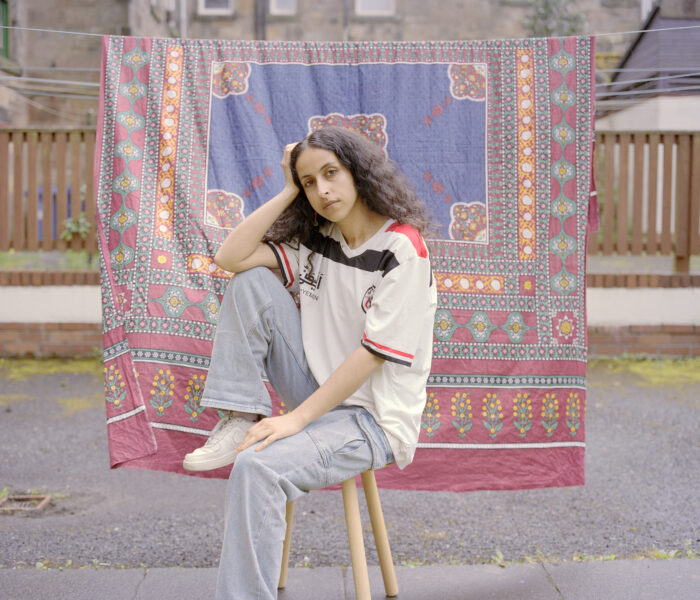“One day our homeland will be free”, reads the tag on the brick wall in front of which Intibint is standing. Singing directly into the camera over a trap-inspired, minimalistic beat, the singer uses her art to convey a message of hope. In her latest single “Ymn Alsa3eed”, Intibint reimagines her homeland, Yemen, through the lens of joy, resilience, and revolutionary spirit, offering both a love letter and a call for justice. The accompanying video is made up of archival footage from Yemen as well as recent images from protests in solidarity with Palestine. Wrapped in the Yemeni flag and holding her passport, the artist expresses the emotional weight of diaspora and longing for a homeland she cannot return to.
For Intibint, the relationship to her homeland is complicated. She grew up between Yemen’s capital, Sana’a, and the UK, but since the civil war broke out in 2014, she has not been able to return to Yemen. For over ten years, the war between the Houthi Zaydi Shia religious, political and military organisation controlling the north of the country and the UAE-backed government in the south and the east has been going on. US-backed and UAE-led bombing campaigns have devastated much of the civilian infrastructure and killed many. To this day, the country remains divided, and since October 2023 has faced renewed bombardment by the US forces. Despite all, it is called “Ymn Alsa3eed”—Happy Yemen.
In conversation, Intibint explains why people call it that and shares her experiences of making political art and launching an online platform for female creatives of Yemeni heritage. She also reflects on how her relationship with music has evolved—from joyful childhood memories of dancing at celebrations to discovering its power as a tool for healing, protest, and connection.
Bringer of Joy
Ilo Toerkell: What role did music play in your upbringing?
Intibint: The main thing I remember about music in my upbringing is that it was mainly fun. Music was always seen as something that brings joy, something we listen to when we dance or do something fun. It was always present at parties, weddings and birthdays. We didn’t play a lot of music at home unless there was something to celebrate. It was more about playing music in community. Only on road trips, my dad would bang out all the classic Arabic tunes.
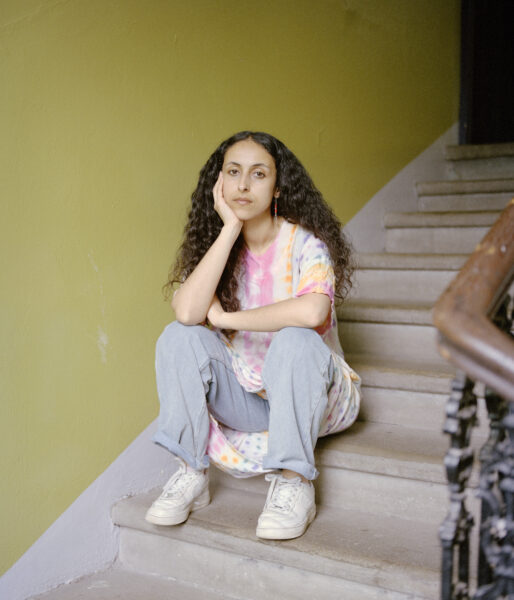 Has your relationship to music changed when you started making music yourself?
Has your relationship to music changed when you started making music yourself?
Once I started making music myself, I found that music was even more than all of those things. It is how I express myself. It allows me access to my emotions, which is not easy, and it is important to have a tool for that. Another thing that I have learned is that music can really change people’s perspectives on things. It can bring people together and start conversations beyond just sound.
How did you first approach music?
I was never taught music professionally. I learnt about music either through the music I was exposed to during my upbringing, through my friends, or on my own by experimenting. There is a lot of value in learning how to play an instrument, but I also think connecting to it and learning on your own can give you a different perspective and connection to it. Music makes me feel very deeply and touches me very personally. That is where I approach music from.
In the Spirit of Revolution
On your latest single “Ymn Alsa3eed (اليمن السعيد)”, you sing about your home country, Yemen. The title translates to “Happy Yemen”. Why happy Yemen?
Happy Yemen is actually a saying or a name for Yemen that people have been using for a long time. Like a historical, cultural term. For me, “Ymn Alsa3eed” is reflective of how I see Yemen and how I have always seen it. When I am there, I am surrounded by so much joy and love, and happiness. That is the core of the song, even though I actually sing about suffering, pain, and the struggle for justice.
Creating this song was a way for me to talk about all the suffering that Yemenis have gone through – are going through – and that so many people around the world can relate to. When we talk about Yemen, even as Yemenis, there is a huge divide between different ideologies and parties, which has made it difficult to come together and fight for our country. One thing all Yemenis agree on, though, is our stance on Palestine, and that is reflected in the music video that includes videos from Palestine protests all over the world. 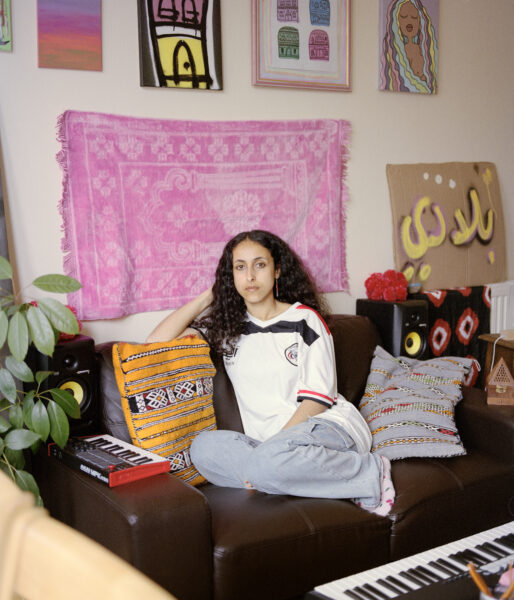
With “Ymn Alsa3eed”, I wanted to make a song that would hopefully bring Yemenis together by speaking about our suffering, our desire for justice, and our revolutionary spirit.
Ultimately, these things exist for all of us despite our potential differences in politics, and the reality is that the oppressors do not discriminate between Yemenis based on their ideology.
In the last 15 months, so many people have been coming together for Palestine, which is so beautiful and long overdue. I feel that the movement for Palestine and people using their voices created space for me to write a song like that. As artists, we are sometimes scared to release something like that, something explicitly political, and with the song, I put out a message I have been wanting to share for so long. I feel like all our struggles are connected and while I wrote this song about Yemen, it applies to all of us everywhere.
Have you gotten reactions to the song?
Yes, so many members of my immediate family messaged me, telling me that the song made them very emotional. After your country has been at war for 10 years, we often don’t even talk about how bad it is anymore. It has been so long that no one really wants to talk about the sad stuff anymore. The song helped me to see that I am not the only one and that we are all still feeling this. From Gaza to Yemen, the revolution is ongoing.
In the lyrics, you address Yemen by singing “ya, Yemen”. In Arabic, “ya” is used to express a direct address to someone. Why that personification?
Maybe because I haven’t had the opportunity to live there for the past 10 years. Yemen has become a place that is so far away from me, but still such a huge part of my life and of me and who I am. It is paradoxical. I have been away from the place for so long that I am not sure I still know it, yet it is with me in everything I do. The verse in which I am addressing Yemen is a reimagined lyric of a song by Abu Bakr Salim, “Thby Al Yaman”. It is a love letter to a person, but at the same time, a love letter to the country – at least that is how I interpret the song. “Ymn Alsa3eed” is doing something similar. In a way, my relationship to Yemen is like a complicated relationship to a loved one.
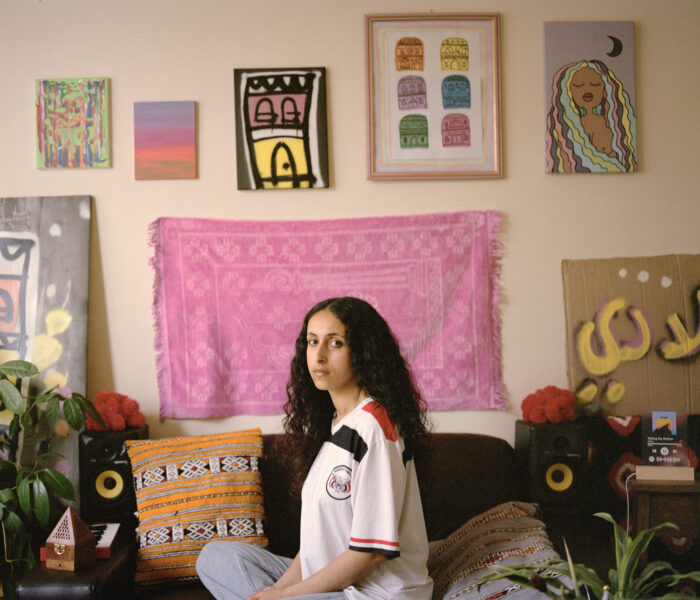
Singing Against the Silencing
Ahead of the new single, you released three covers of classic tunes like “Ounadikum” by the Palestinian poet Tawfiq Zayyad and “Kanat Ayam” written by Sudanese poet Ibrahim Rajab. Why did you choose to work with this material?
I have always felt guilty about living in the UK, especially after the war started and my family was still in Sana’a. A lot of my family is still there, but my immediate family, my parents and my siblings, have been able to leave.
There is a guilt that comes with not being there with the others. For a long time, I felt like I betrayed my people by leaving and that it wouldn’t be my place to talk about it or use anything from the tradition. Many people living in the diaspora feel that way. It took me a while to accept that my feelings are valid and that actually reconnecting with traditional Yemeni art that I grew up with is healing for me and people like me. I also realised that this was an opportunity to represent Yemeni and Arab culture within spaces that may not usually see that.

During a time when silencing became a prominent tool to suppress calls for change from our governments and the establishments, many of us are part of performing these songs felt like a form of resistance, especially “Ounadikum” and “Kanat Ayam”.
One of the covers is the song “Ounadikom” by Palestinian singer Ahmad Kaabour. What does that song mean to you?
Ahmed Kaabour’s “Ounadikom” is a song he wrote during times when his community was experiencing tragedy. This song was his way of calling for unity and resistance in the face of these tragedies, but he does it by expressing love and devotion to those who do dare to resist. I found this beautiful, and I felt connected to this perspective and way of using art. Especially as someone who is witnessing what is happening in their country from the outside, which has been a difficult experience. It felt like the right song to sing at this time. In a way, “Ounadikom” is also about all the tragedies we carry, which are never the same, but connected still. It is a call to see that commonality and to come together to resist all of this.
Another song you released is “Silently”. It is a short but powerful ballad about how too many remain silent in the face of injustice.
I wrote “Silently” in December 2023, thinking about everything going on and Israel starting its aggression in October 2023. Back then, people were still catching up. Many weren’t as outraged as they are now. Too many still aren’t actually, or choose to remain ignorant. It reminded me a lot of when the war in Yemen started. It was such a surreal experience, like living in a parallel world. People did not know something was going on, or they did not care. No one was reporting on Yemen, on the bombs dropped by Saudi Arabia and its allies.
Every day, I was fearing for my family’s lives, and in the UK, I would go outside and feel nothing of it. That is a very isolating experience. They called [the war in Yemen] a forgotten war, and still do sometimes.
Has that changed now with the mobilization for Palestine?
Yes, I think so. I have never seen anything like it, this mass mobilization and protests in solidarity with Palestine. So many people eventually stopped being silent. And as much as the current situation is still horrible and ongoing, you cannot deny the power of the people. It has become more difficult to remain silent. Of course, too many are still watching silently, and governments are ignorant of or profiting from the suffering. I hope that over time, that will change. If we come together, we can really change the world.
Resources: Stop US Support of War in Yemen
Building Bridges
Beyond music, you also use different media of art to convey your message. On your Instagram, you have shared collages, illustrations, and paintings. Via Intibint Studio you regularly drop new T-shirt designs. Why do you use all these different media?
My mind is always going, and creating art allows me to manage my thoughts and communicate them clearly. That’s why I love having these different media to work with. Each of them allows me to express something else. Each medium communicates differently with anyone who finds it.
Your name, Intibint, translates to “you’re a girl”, which is something often given as an excuse to girls and women as to why they cannot do certain things in life, like becoming musicians or artists. You have done exactly that. Has the meaning of the name changed for you?
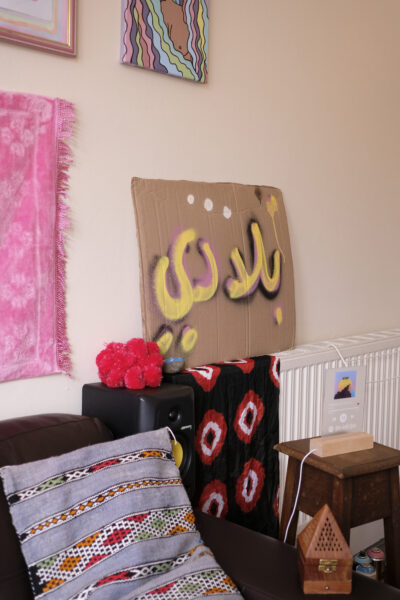
I think about that a lot. I am growing, my life is changing, and I wonder, does the name still apply to me? Should I be representing myself this way? But regardless of my personal experience, the name is still relevant. Women are still fighting for equal rights, and gendered boundaries are still very much in place.
I hope that other women and girls see me doing these things that I was told I couldn’t and realise that they too can follow their dreams even if “intibint”.
To empower women and girls from Yemen, you have also launched the online platform for Yemeni female artists called Al Yamaniah. A print edition, brought to life by Asma Hamdi and Asma Ibrahim, with over 60 Yemeni artists, has also recently been launched. Have you noticed any changes for female artists in Yemen?
There have definitely been developments. We received so many submissions from artists inside Yemen, which is a testament to the hard work, bravery, and talent of female artists in Yemen. There are so many boundaries to making art. Sometimes things that we are not even aware of, living in the UK or in the diaspora. Stuff like electricity running out. To see all these amazing artists pursuing and thriving in their art despite the hardship is amazing. Through the platform and their engagement, I have learned that there are no limits to what you can do.
For me personally, the launch of the print magazine was a full-circle moment. I grew up in an environment where Yemeni women just did not do art. And now we, a team of female Yemeni artists, have created this whole platform with over 60 artists. Al Yamaniah is a place for them to feel represented and build connections with other artists.
All photos by Miriam Ali
“Ymn Alsa3eed (اليمن السعيد)” by Initbint is out now. You can stay up to date with Intibint via Instagram and follow Al Yamaniah here.



